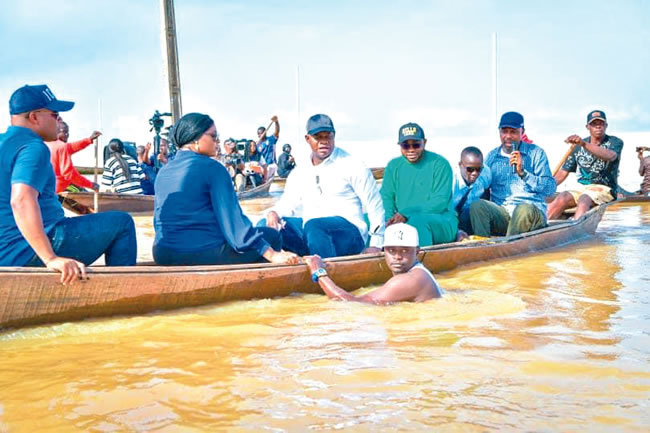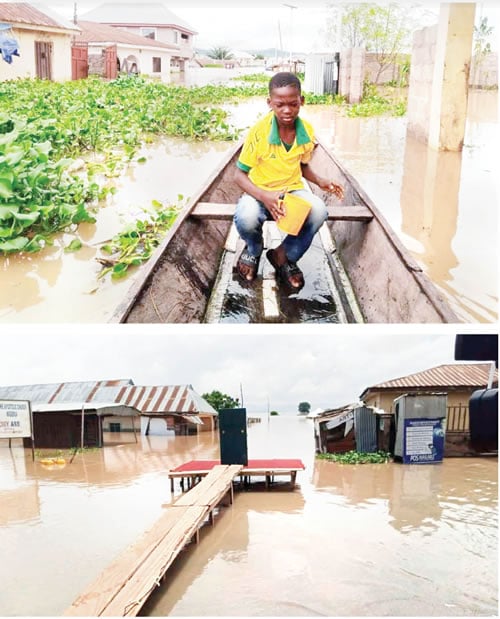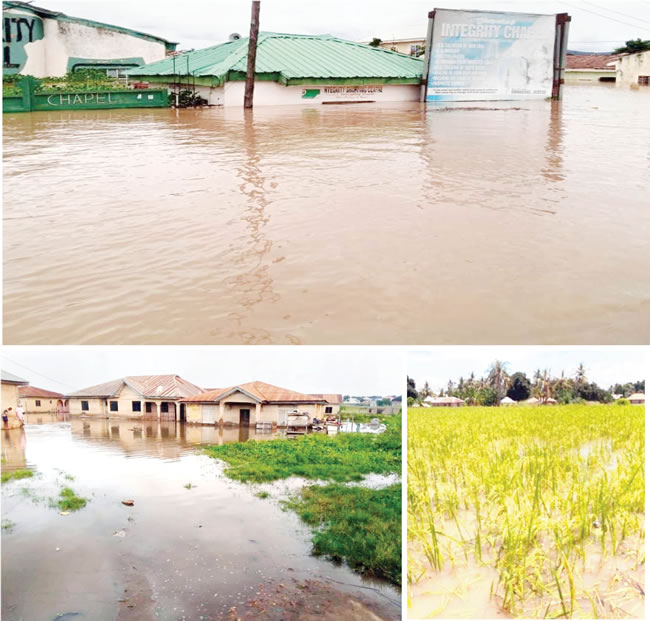As residents of communities across Kogi State groan under the weight of devastating effects of heavy flooding that has rendered thousands homeless, destroyed properties worth millions and submerged entire communities, YEKINI JIMOH, reports that the worst hit are farmers under the IFAD-VCDP Rural Poor Stimulus Facility (RPSF), who not only lost homes and properties, but also lost their source of livelihood which may throw them into bankruptcy.
The last few days have not been an easy one for residents in communities around Kogi due to the massive flood that has taken over the state.
The catastrophe has been described as unprecedented, as the state last experienced such heavy flooding exactly a decade ago. When compared to the current situation, the 2012 flood is still a baby as the current flood has taken over nine local government councils in the state.
The flooded local government areas which lie along Rivers Niger and Benue are Lokoja, Kogi-Koto, Ajaokuta, Ofu, Igalamela-Odolu, Bassa, Idah, Ibaji and Omala. Ibaji seems the worst affected as it is almost 100 per cent under water while the rest range from 30 percent upwards and other inland LGAs also have some degree of flooding from smaller rivers and tributaries.
Kogi State has now been identified as one of the worst hit states, with a huge part of the state capital submerged by flood for over two weeks; in Ganaja, Gadumo, Adankolo, Old Market and Sarkin Noma, lakes and rivers now exist in places that used to be dry land inhabited by people as a result of the rivers of the confluence overshooting their banks.
Currently, River Niger is full to the brim and this has forced the water to feed other water channels that branch to houses and flood the communities. The extent of damage was confirmed by the lawmaker representing Ibaji State Constituency at the state assembly, Honourable Atule Egbunu, who stated that three persons have been killed while over 50,000 people have been displaced by flood in Ibaji Local Government Area of the state.
The lawmaker said thousands of houses and farmlands have been submerged by the disaster which he described as an unfortunate annual disaster, adding that relocating the victims to a safer place like Idah is currently difficult and beyond the capability of the victims.
He noted that the people currently do not have what it takes to address the damage caused by the disaster and appealed to the state and Federal Governments as well as the international community to come to their aid.
Some victims of the flood in separate interviews called on the federal, state government and well meaning individuals in the society to extend kindness to them in form of relief materials.
And aside thousands being displaced from their homes and suffering huge loss of properties and lives, there are those who have lost hope that even after the lands dry up, their life may likely not have essence again as there is nothing again that they can rely on to move on following the loss of their farm and crops to the flood.

Samson Abah, a resident of the new layout of Gadumo, whose two houses have been submerged by flood, called on the state government to allocate virgin land to flood victims, far from the river, for them to build their houses among other requests.
Also, Value Chain Development Programme (VCDP) rice farmers who are beneficiaries of the
FGN/IFAD assisted project in Kogi have lamented over the colossal loss of their rice farms to flooding.
The farmers under the IFAD-VCDP Rural Poor Stimulus Facility (RPSF), aimed at cushioning the effects of COVID-19 pandemic on rural farmers said their situation is a clear story of moving from frying pan to fire as several of them are already distressed and may develop life threatening ailments because their only hope of survival was taken away by the flood.
The farmers who are mainly from Ibaji, Lokoja and Ajaokuta Local Government Areas, in a chat with Nigerian Tribune said their farmlands had been completely submerged by flood.
Narrating his ordeal, the Ibaji Local Government Liaison Officer, Mr Achogu Fredrick, said about a total of 216 rural farmers in Ibaji who benefitted from the IFAD-VCDP RPSF, had all lost their rice farmlands to flood.
According to him, each of the 216 farmers had one hectare of rice farmland totaling 216 hectares in Ibaji, and all have been submerged, adding that IFAD/ VCDP painstakingly funded RPSF to pull farmers from the dungeon of poverty created by Covid 19 in the system.
“Unfortunately, the flood event pushed the people back again into hunger and starvation. The RPSF grant which was a palliative to support us as vulnerable rural farmers to cushion the effect of the COVID-19, have been lost again.
‘’A total of 216 farmers who benefitted from the RPSF grant have lost everything to the flood. Indeed, it is a double tragedy for us. We did not only lose our farmlands but also our houses and properties. Presently the fear of what tomorrow holds is the major challenge for all the farmers.
‘’We are calling on the federal, state and other relevant organisations to come to our aid because this is a colossal damage which cannot be repaired. In fact, the entire Kogi VCDP farmers are in mourning currently,” he said.
Other beneficiaries in Ibaji: Mr Friday Ofor, Joel Ogala, Enefo Festus, Samuel Joseph and Victoria Ajodo, talking separately, expressed sadness over the sudden loss of their rice farms to flooding, .
‘’We never expected this kind of great loss, it took us unawares. We are appealing to the relevant agencies and authorities to come to our aid,’’ Ajodo said.
Also speaking, the youth and women farmers’ leaders in both Kabawa and Magajiya Clusters in Lokoja, Seidu Liman and Maryam Abubakar, who are also beneficiaries of RPSF described the loss as a great damage to them and their families after investing time and resources only to swept away by flood.
Liman said the devastating effect of the loss of their rice farmlands to flooding would be huge on them and their wellbeing. They further called on the government to come to their aid by providing palliatives for immediate relief, reiterating that the flood had further exposed them to more suffering than before.
Speaking, Dr Stella Adejoh, State Programme Coordinator of IFAD/VCDP, expressed sadness over the destruction of rice farms of the vulnerable rural farmers by flooding

According to her, several people lost their means of livelihood during the COVID-19 pandemic, and were consequently faced with hardships including vulnerable rural farmers. She explained that IFAD-VCDP through the RPSF grant decided to help the vulnerable farmers affected by the pandemic to bring them out of their poverty situation.
Dr Adejoh said the farmers were provided with grant in form of inputs by IFAD such as fertilizer, certified rice seed, selective and non-selective herbicides, among others.
She noted that a total of about 614 rural farmers cut across the four rice producing Local Government Areas of Lokoja, Ibaji, Ajaokuta and Kabba/Bunu, benefitted from the RPSF in the state.
‘’It is very unfortunate and devastating that these poor vulnerable farmers have now lost almost everything due to flooding. I feel very sad and demoralised over the colossal loss,’’ she said.
The Chairperson, Kogi NGO Network (KONGONET), Ambassador Idris Ozovehe Muraina has also called on Kogi State government to quickly put mechanism in place in order to render support to the victims of the 2022 flood disaster.
Muraina who is also the Executive Director, Renaissance Care and Empowerment Foundation (RECEF) based in Kogi State made the call in Lokoja while speaking on the current flood disaster in Kogi state.
He said that over 1000 houses within Lokoja have been submerged in water, noting that Bassa, Ibaji , Ofu, Idah , Olamaboro, Ajaokuta, Dekina, Kogi Koton-Karfe local government areas of Kogi state have suffered similar fate.
According to him, “What is happening now in Kogi State is massive flood disaster that need the assistance of the federal government and other well meaning individuals, corporate organizations and international agencies.
“The Nigerian Meteorological Agency (NiMet) produces the Seasonal Climate Prediction (SCP) annually in fulfilment of its statutory obligations and sometimes ago the agency issued a statement and provided a guideline giving us the projection of what the situation will look like this year with respect to flood across the country.
“The agency said there is likelihood of massive flooding in some states in Nigeria and for us the Kogi NGOs , we tried to engage people with the NiMet report through a radio programmes held two months ago talking to residents living on low land the need for them to move up land because of the impending flood disaster.
“As part of our sensitization we urged the state government to strengthen the State Emergency Management Agency (SEMA) to be at alert in case the flood disaster come as earlier predicted,” he said.
He charged the state government to be proactive in setting up Internally Displaced Persons (IDP) camps in ten local government areas of Kogi state where flooding always cause damage and commended Give Directly, an international organization that provide support for people facing emergency cases and Christian Aid, who are in Kogi state to create a data base of people affected by the 2022 flood disaster for their efforts
In Idah, the Catholic Archbishop of Idah Diocese in Kogi state, Most Revered (Dr) Anthony Ademu Adaji (MSP), has yielded to the displaced people’s clamour after being rendered homeless by the natural disaster of flooding by providing temporary shelter and transportation to enable the victims move from Ibaji Local Government to Idah Local Government area of the state.
The Directorate of Communications, Catholic Diocese of Idah, in a statement issued by Rev Anthony Okoliko, asked victims and their families to respond to the mission’s overture. The gesture by the diocese in responding to the distressed was part of efforts to see to people’s welfare by the Catholic community in the area.
Consequently, the Catholic community had designated one of its own clergy, Rev Fr Innocent Apeh, as the contact person saddled with the responsibility of liaising with victims and their families to ensure temporary succour for flood victims in Ibaji.
Also, the Hydroelectric Power Producing Areas Development Commission (HYPPADEC) has commenced distribution of relief materials to victims of flood arising from release of water from hydroelectric power generating dams in the country.
Engr Abubakar Sadiq Yelwa, Managing Director of HYPPADEC who flagged off the first phase of the distribution in Koton-Karfe, said 113 households from communities in the 10 affected Local Government Areas made the first list.
The Managing Director, represented by Jimoh Haruna Gabi, Director, Finance and Administration in the Commission, said the exercise was in response to the devastations caused by flooding of riverine communities by water released from hydroelectric generating dams in the last two weeks.
He said that the commission was created basically to ameliorate the pains of community members whose means of livelihood were affected by the floods.
“You will recall that the commission was created to address ecological challenges bedeviling HYPPADEC member states due to operations of the dams. We cannot do less than what we have done. We feel their pains, when they sneeze, we catch cold and that is why we are here to identify with them in this unfortunate incident,” he said.
The Managing Director however called on Kogi State government to upscale its awareness and enlightenment campaigns to riverine communities to educate them, using technical information to avert or minimise effects of floods.
“This advice became necessary because of the frequency of flooding in our communities. Flood is almost inevitable but we can control it to minimise the level of devastations. As the wise ones will say, prevention is better than cure.
“Today, we have brought relief materials that represent a widow’s mite of the commission. It is not as if we can really feed everybody but we have shown kind gesture to everybody,” he said.
The HYPPADEC Managing Director however expressed appreciation to Governor Yahaya Bello for always being there for the commission adding that, “in all our programmes, the governor has never failed us.”
Mr Victor Adewale Omofaiye, the Kogi state Commissioner for Environment speaking at the occasion said HYPPADEC had become a household name. He also commended Governor Bello for being part of the force that brought HYPPADEC into being, adding that the commission was making positive impact in 10 Local Governments Areas of the state including Adavi, Koton-Karfe, Idah, Ibaji, Omala, Lokoja, Bassa, Igalamela-Odolu, Ofu and Ajaokuta.
On her part, Engr Joan Ogwuche, Kogi State Coordinator of HYPPADEC said the relief materials were meant to cushion the excruciating conditions of members of the affected communities and expressed the hope that they would be judiciously utilised.
The relief materials include mattresses, rice, millet, beans, noodles, detergents as well as a medical outreach to diseases and ailments arising from the effects of the flood which has consistently devastated the communities in the last two weeks.
Speaking, the Ohimege-Igu of Koton-Karfe, Alhaji Abdulrazaq Sani Isa-Koto regretted that flooding had become a recurring decimal particularly in Kogi Local Government as most of the settlements were riverine and on the banks of Rivers Niger and Benue.
“So anytime there is flooding, we are always at the receiving end. As I speak with you today, virtually all the riverine communities in Kogi Local Government are no more. They have relocated.
“Today as we speak, we have lost our farmlands our properties our houses. So, our happiness is in these palliatives that we are receiving today. So, we are appealing to the State Government to support the victims to relocate. The land is available. We have provided land,” the Ohimege said.
Meanwhile the Kogi State government has made a passionate appeal to President Muhammadu Buhari to declare a state of national disaster due to flooding in Kogi and other similarly affected states.
The state governor, Yahaya Bello, who made the appeal, said the declaration will help to unlock the nation’s latent capabilities to respond more aggressively with more men, money and materials to this harrowing situation.
He mentioned that the 2022 floods have been confirmed as Nigeria’s worst flood disaster in a decade, and they are becoming progressively worse than those of 2012 and 2018.
According to him, “the flooding has affected the nine local government areas which lie along the Rivers Niger and Benue, namely, Lokoja, Kogi-Koto, Ajaokuta, Ofu, Igalamela-Odolu, Bassa, Idah, Ibaji and Omala. Ibaji is almost 100% under water while the rest range from 30% up. Other inland LGAs also have some degree of flooding from smaller rivers and tributaries.
“We therefore have a serious and humanitarian tragedy on our hands, but I wish to assure every person, family and community that has been affected that they are not alone and that help is coming. Even before the floods came we had activated our early response systems to make sure that succour reaches those affected in a timely manner.
“Even though we are still mapping the red zones as they develop, the Kogi State Emergency Management Agency (KOGISEMA) and other first responders are already hard at work across the state. At-risk communities were informed and encouraged to evacuate long before the flooding began and Internally Displaced Persons Camps were set up and put at their disposal.
“We are also mobilizing help from traditional partners such as the National Emergency Management Agency, the Federal Ministry of Humanitarian Services, Disaster Management and Social Development as well as socially responsible corporate entities. Of course, the Kogi State Government will welcome public-spirited individuals, groups and bodies who may wish to show love to their fellow humans in distress through donations of funds and essentials.
“What this means is that in the short term we are providing affected persons and communities with shelter at our various Internally Displaced Persons (IDP) Camps, as well as security, food, medicines, clothing and cash grants for necessities, among others. In the long term, we will need to gear efforts towards more sustainable solutions where possible.
“The most common sense and humane option left now is to clear human habitations and businesses from the banks of the Rivers Niger and Benue where possible. Soon, we will embark on clearing the lowlands along the entire flood-plains in the flood endemic LGAs. This will allow the rivers unimpeded flow during their annual flooding,” Governor Bello stated.
ALSO READ FROM NIGERIAN TRIBUNE
WATCH TOP VIDEOS FROM NIGERIAN TRIBUNE TV
- Let’s Talk About SELF-AWARENESS
- Is Your Confidence Mistaken for Pride? Let’s talk about it
- Is Etiquette About Perfection…Or Just Not Being Rude?
- Top Psychologist Reveal 3 Signs You’re Struggling With Imposter Syndrome
- Do You Pick Up Work-Related Calls at Midnight or Never? Let’s Talk About Boundaries







